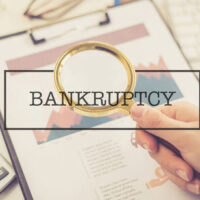What Happens To Insurance Money When You File For Bankruptcy?

In many cases, accidents can cause people to file for bankruptcy or cause them to think about filing. But how will a bankruptcy affect your personal injury or property damage case? And what happens to any proceeds that you win, whether by settlement or by jury verdict, in your case?
Timing Matters
The threshold question is whether your accident happens before or after filing your bankruptcy case. If the accident is afterwards, then the accident is not part of the bankruptcy estate. No proceeds are subject to the bankruptcy court and your bankruptcy will not affect your personal injury case in any way.
If the accident is after the bankruptcy case is filed, the bankruptcy will have a bigger impact on your personal injury case.
Note that the important deadline for determining whether your bankruptcy will affect anything created to your personal injury claim is the date of the accident — not the date that you realize you are injured, or the date that you actually receive any insurance proceeds or money from the other side.
Listing the Case and Protecting Proceeds
Your case is what is known as a contingent asset, and must be listed as an asset in your bankruptcy.
This can cause a problem, because settlement money or money from an injury case are assets that can be taken by a bankruptcy court if they can’t otherwise be exempted. Unfortunately, most people only tend to sue when the potential recovery is far greater than the exemption amount allowed in bankruptcy law, so unless your injury claim is very minor, it may be taken by the trustee in a Chapter 7 bankruptcy.
The good news when it comes to bankruptcy and injuries is that at least any medical (or other) expenses that you incurred in the accident will be wiped out and discharged like any other debt in your bankruptcy.
Property Insurance Claims
Property insurance claims work much the same way. However, you may be able to keep any proceeds that represent the replacement of any otherwise exempt asset.
For example, assume that your homestead was damaged by an insurable cause, and the insurance company is paying $50,000 to fix your property. If the $50,000 is all going to fix or repair homestead property, and the homestead is exempt anyway, the $50,000 may be able to be considered exempt.
But if the insurance is going to replace personal possessions, you may be limited to keeping only the amount of the insurance proceeds that would be considered the “wildcard” exemption—between $1,000-$4,000, depending on whether or not you own your home.
Disclose Everything
Remember that if you don’t disclose to the bankruptcy court that you have a pending claim or lawsuit of any kind, your claim or lawsuit could be dismissed. So it is always best to disclose any pending claim—even if a lawsuit hasn’t actually been filed yet.
Call the West Palm Beach bankruptcy lawyers at Kelley Kaplan & Eller at 561-264-6850 today to help you understand how bankruptcy may affect major events in your life.
Resources:
leg.state.fl.us/statutes/index.cfm?App_mode=Display_Statute&URL=0200-0299/0222/0222.html
msnb.uscourts.gov/sites/msnb/files/opinions/Smith%2015-10138.pdf



